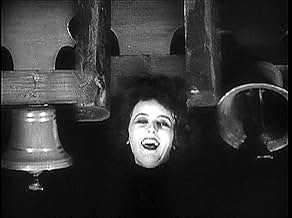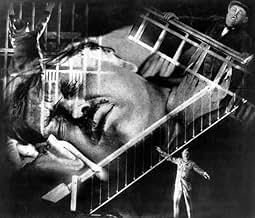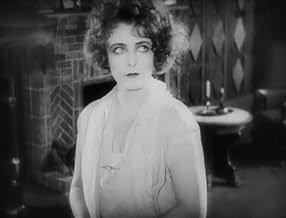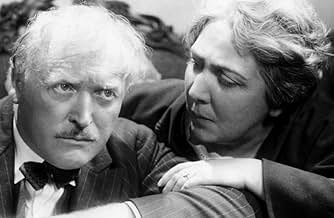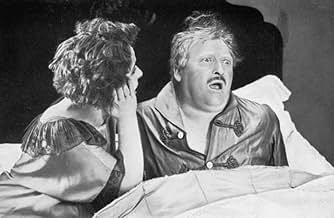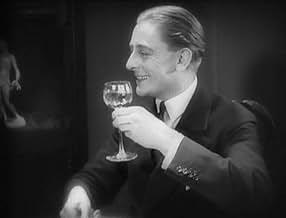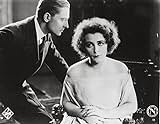IMDb RATING
6.8/10
860
YOUR RATING
A scientist is tormented by an irrational fear of knives and the irresistible compulsion to murder his wife.A scientist is tormented by an irrational fear of knives and the irresistible compulsion to murder his wife.A scientist is tormented by an irrational fear of knives and the irresistible compulsion to murder his wife.
Featured reviews
I come to this as someone who thinks the presentation of dreams - much more than dreams themselves - imitates the ways we use to structure the self that presents the world to us. Charting the cinematic effort of that is exciting to me.
And well, this is an interesting film to say the least, and from an interesting time. The backstory is that Freud himself approved of it and moreover sent two from his trusted Viennese circle to aid and supervise the UFA production on what would be a rational explication of psychoanalysis. You should know that his were radical , modern ideas in their time and for twenty years had been a sensation. And the Weimar public at large was struggling with deep-seated nightmares of their own, evidenced in Caligari and elsewhere, so it was very receptive to the new science for sleep, and probably every bit as confused about it as the somnambulist in Caligari.
But oh boy, haven't our narrative devices come far since Freud.
In the film, we have suddenly strange , unsettling urges followed by a puzzling nightmare, and then a psychoanalyst sits us down to kindly explain and assuage irrational fear.
Nevermind the obtuse focus on sex and symbolic interpretation of dreams, that was Freud. The emphasis on phallic imagery, the incidental aversion to knives linked to imaginary castration in the patient. Jung would make the transition to a character-based dreamworld, and we are growing out of that too. We are insanely more complicated beings these days than a logic like Freud's can explain, our dreams much more layered, and you can see that in contemporary filmmakers who are dabbling with dream.
We are unsure these days where day begins, that much (night) was certain then. Our dreams also come from movies and TV, from tweets and instagram, and we're beginning to understand what the Buddhist had been saying all along; the mind's function is to project snippets of narrative around a fictional self, and the most loaded dream is no different in mechanism to the most trivial thought. You are always at the center of an illusionary world you have set in motion, but you won't know that without a center in emptiness.
The trigger for it is something to consider though. A murder (by knife) has taken place the day before in the same street, a wife killed by the husband. The same urge somehow surfaces in our guy.
The actual nightmare has dated, along with the logic behind it and German expressionism. It is this eerie confluence of semiconscious machinery that still carries power. It is this aspect of dreaming Pabst would cultivate in later works.
And well, this is an interesting film to say the least, and from an interesting time. The backstory is that Freud himself approved of it and moreover sent two from his trusted Viennese circle to aid and supervise the UFA production on what would be a rational explication of psychoanalysis. You should know that his were radical , modern ideas in their time and for twenty years had been a sensation. And the Weimar public at large was struggling with deep-seated nightmares of their own, evidenced in Caligari and elsewhere, so it was very receptive to the new science for sleep, and probably every bit as confused about it as the somnambulist in Caligari.
But oh boy, haven't our narrative devices come far since Freud.
In the film, we have suddenly strange , unsettling urges followed by a puzzling nightmare, and then a psychoanalyst sits us down to kindly explain and assuage irrational fear.
Nevermind the obtuse focus on sex and symbolic interpretation of dreams, that was Freud. The emphasis on phallic imagery, the incidental aversion to knives linked to imaginary castration in the patient. Jung would make the transition to a character-based dreamworld, and we are growing out of that too. We are insanely more complicated beings these days than a logic like Freud's can explain, our dreams much more layered, and you can see that in contemporary filmmakers who are dabbling with dream.
We are unsure these days where day begins, that much (night) was certain then. Our dreams also come from movies and TV, from tweets and instagram, and we're beginning to understand what the Buddhist had been saying all along; the mind's function is to project snippets of narrative around a fictional self, and the most loaded dream is no different in mechanism to the most trivial thought. You are always at the center of an illusionary world you have set in motion, but you won't know that without a center in emptiness.
The trigger for it is something to consider though. A murder (by knife) has taken place the day before in the same street, a wife killed by the husband. The same urge somehow surfaces in our guy.
The actual nightmare has dated, along with the logic behind it and German expressionism. It is this eerie confluence of semiconscious machinery that still carries power. It is this aspect of dreaming Pabst would cultivate in later works.
G.W. Pabst's fourth film "Geheimnisse einer Seele" (Secrets of a Soul, 1926) was the first film to tackle the subject of psychoanalysis. Even though a controversial subject, the film managed to make a profit. The filmmakers desperately wanted Sigmund Freud himself to join the production as an expert, but Freud strongly refused, not believing that the medium of film could do justice to his psychological theories. In this, he was probably right, since it's doubtful that things would be this neatly spread out in any person's mind.
Werner Krauss plays a bourgeois scientist, who has a wife, 20 years younger than him. There is a murder in their neighbor's apartment, and suddenly Krauss starts to feel an inexplicable fear of knives and also an urge to murder his wife. We have a dream sequence, that is well executed enough, but it doesn't leave any kind of mystery to the film, which tries really hard to be a mystery. Of course we still get to return to it once the protagonist receives psychoanalytical treatment. Doesn't really take Freud to interpret this dream, but maybe people in 1926 weren't yet tired of freudian cliches.
This film looks like a pioneering work, but its greatest value lies in the films that it may have inspired. The dream sequence brings to mind Hitchcock's "Spellbound" (1945), and the depiction of guilt resembled Fritz Lang's "M" (1931) a little. The hold Pabst has over his film is too pedantic, especially towards the end. But one thing is certain, he does really believe in the science that he tries to sell you, and the film's message about how one can heal from psychological illnesses just like any other, is a positive one.
Werner Krauss plays a bourgeois scientist, who has a wife, 20 years younger than him. There is a murder in their neighbor's apartment, and suddenly Krauss starts to feel an inexplicable fear of knives and also an urge to murder his wife. We have a dream sequence, that is well executed enough, but it doesn't leave any kind of mystery to the film, which tries really hard to be a mystery. Of course we still get to return to it once the protagonist receives psychoanalytical treatment. Doesn't really take Freud to interpret this dream, but maybe people in 1926 weren't yet tired of freudian cliches.
This film looks like a pioneering work, but its greatest value lies in the films that it may have inspired. The dream sequence brings to mind Hitchcock's "Spellbound" (1945), and the depiction of guilt resembled Fritz Lang's "M" (1931) a little. The hold Pabst has over his film is too pedantic, especially towards the end. But one thing is certain, he does really believe in the science that he tries to sell you, and the film's message about how one can heal from psychological illnesses just like any other, is a positive one.
This film of G. W. Pabst although far from being one of his best, lays claim to being the first attempt to bring together Expressionism and the psychological theories being expounded at the time by Siegmund Freud and his contemporaries. Producer Hans Neumann much admired Freud's seminal 'Interpretations of Dreams' but faced with Freud's reluctance to become involved he recruited two of his assistants as 'technical advisors'.
Suffice to say it is the dream sequence, filmed in the style of the French avant-garde, that is the source of the film's notoriety, not to mention its menacing images of razors and knives. These elements were to prove influential, not least in the extraordinary 'knife' scene from Hitchcock's 'Blackmail' and perhaps in Salvador Dali's contribution to the same director's 'Spellbound'.
The central figure here is played by the brilliant but controversial Werner Krauss who was never able to shake off the stigma of his collaboration with the Nazis and who, despite the admiration of his fellow actors, was to die in obscurity.
The weakness here lies in the discrepancy in his age and that of his gorgeous young wife played by Ruth Weyher, especially as they are referred to in the script as having been childhood sweethearts!
As the film had a documentary purpose it was marketed by UFA's 'Kulturfilm' department and despite its visual attractions and technical expertise the psychoanalytical aspect is somewhat simplistic and it is hardly surprising that the eminent Dr. Freud distanced himself from it.
Suffice to say it is the dream sequence, filmed in the style of the French avant-garde, that is the source of the film's notoriety, not to mention its menacing images of razors and knives. These elements were to prove influential, not least in the extraordinary 'knife' scene from Hitchcock's 'Blackmail' and perhaps in Salvador Dali's contribution to the same director's 'Spellbound'.
The central figure here is played by the brilliant but controversial Werner Krauss who was never able to shake off the stigma of his collaboration with the Nazis and who, despite the admiration of his fellow actors, was to die in obscurity.
The weakness here lies in the discrepancy in his age and that of his gorgeous young wife played by Ruth Weyher, especially as they are referred to in the script as having been childhood sweethearts!
As the film had a documentary purpose it was marketed by UFA's 'Kulturfilm' department and despite its visual attractions and technical expertise the psychoanalytical aspect is somewhat simplistic and it is hardly surprising that the eminent Dr. Freud distanced himself from it.
There are a lot of important elements the restorers chose to omit from the movie. There are letters that are opened & are supposed to appear on screen for the audience to read. Gone. A man pulls up on a bike delivering a telegram. Gone. All references to the name of the man Martin Fellman are omitted. When he comes home after leaving his key,he sits down in front of the idol. It disappears leaving only a baby image. Gone. His wife see a dog & litter of puppies, She says: "I wish I had a child." Gone. The Murnau people made the movie incoherent by this censorship. Its a disgrace. They had no right to do these changes to the movie as they are not part of the creative process.
There are many people who consider G. W. Pabst to be the finest director of German silent cinema. I am not one of them. I find his movies to be poorly paced and lacking in visual interest. They are kept afloat by their adult subject matter and by the performances of his female stars (Greta Garbo in THE JOYLESS STREET, Edith Jehanne and Brigitte Helm in THE LOVE OF JEANNE NEY, and of course Louise Brooks in PANDORA'S BOX and DIARY OF A LOST GIRL). A prime example of this is THE WHITE HELL OF PILZ PAULU co- directed by Pabst and Arnold Fanck and starring Leni Riefenstahl. Compare the dramatic scenes with the rest of the film and I think you'll see my point which brings me to SECRETS OF A SOUL.
This was Pabst's follow-up to the highly successful JOYLESS STREET (1925). The subject matter and the film's raison d'etre is the "new" subject of psychoanalysis. The breakdown of the protagonist and the fascinatng dream sequences (designed by Erno Metzner) are true to the film's Expressionist roots while the unfolding analysis of his problems are still of interest to a modern audience. There is also an amazing central performance from Werner Krauss as the patient undergoing analysis that really holds the movie together.
Krauss may be the finest German performer from that time period. He has a greater range than Emil Jannings and is less stylized than Conrad Veidt. Unfortunately very little of his work survives and his most famous role (CABINET OF DR CALIGARI) doesn't do him justice. This film does. Also check out his Iago in the 1922 version of OTHELLO and Orgon in the 1925 TARTUFFE (both opposite Jannings). SECRETS OF A SOUL is part of the Kino set GERMAN EXPRESSIONISM which contains 3 other films (CABINET OF DR CALIGARI, WARNING SHADOWS, and THE HANDS OF ORLAC). All of these films can be obtained separately although if you don't have the others I highly recommend the set...For more reviews visit The Capsule Critic.
This was Pabst's follow-up to the highly successful JOYLESS STREET (1925). The subject matter and the film's raison d'etre is the "new" subject of psychoanalysis. The breakdown of the protagonist and the fascinatng dream sequences (designed by Erno Metzner) are true to the film's Expressionist roots while the unfolding analysis of his problems are still of interest to a modern audience. There is also an amazing central performance from Werner Krauss as the patient undergoing analysis that really holds the movie together.
Krauss may be the finest German performer from that time period. He has a greater range than Emil Jannings and is less stylized than Conrad Veidt. Unfortunately very little of his work survives and his most famous role (CABINET OF DR CALIGARI) doesn't do him justice. This film does. Also check out his Iago in the 1922 version of OTHELLO and Orgon in the 1925 TARTUFFE (both opposite Jannings). SECRETS OF A SOUL is part of the Kino set GERMAN EXPRESSIONISM which contains 3 other films (CABINET OF DR CALIGARI, WARNING SHADOWS, and THE HANDS OF ORLAC). All of these films can be obtained separately although if you don't have the others I highly recommend the set...For more reviews visit The Capsule Critic.
Did you know
- TriviaSigmund Freud, whose book "The Interpretation of Dreams" largely influenced this film, was approached to serve as a consultant on psychoanalysis. Freud declined, believing that film could not capture the complexities of the science of psychoanalysis.
- Alternate versionsThere is an Italian edition of this film on DVD, distributed by DNA Srl: "I MISTERI DI UN'ANIMA (1926) + OMBRE AMMONITRICI (1923)" (2 Films on a single DVD), re-edited with the contribution of film historian Riccardo Cusin. This version is also available for streaming on some platforms.
- ConnectionsEdited into Die Geschichte des erotischen Films (2004)
Details
- Release date
- Country of origin
- Languages
- Also known as
- Tajna jedne duše
- Production company
- See more company credits at IMDbPro
- Runtime1 hour 37 minutes
- Sound mix
- Aspect ratio
- 1.33 : 1
Contribute to this page
Suggest an edit or add missing content

